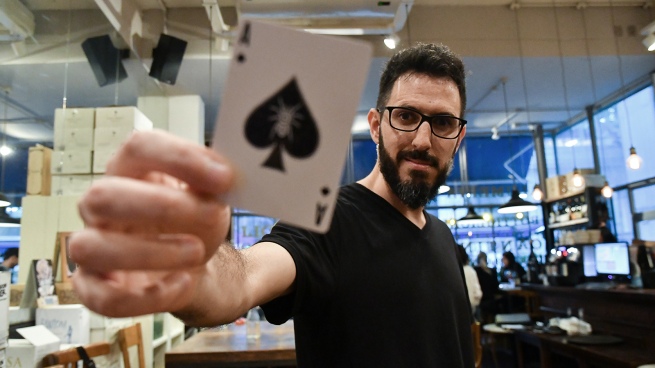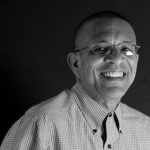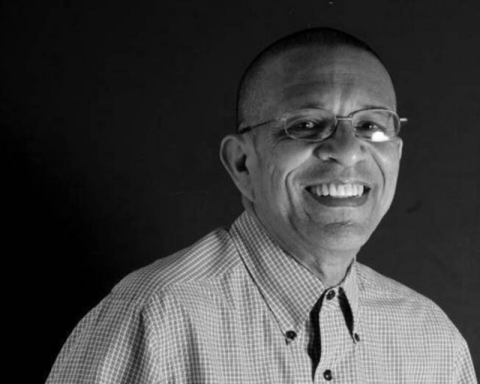Good magicians don’t expect applause as a reward for a good trick. They confirm that they managed to amaze the public when after making an illusion there is a silence or a long expression of astonishment.
Adrián Lacroix is an Argentine illusionist and mentalist who is at the height of his self-taught career, that started at age eight when he marveled at David Copperfield on television and tried to copy his tricks.
He would never have imagined that decades later and In the midst of a pandemic, the richest and most well-known magician in the world was going to want to meet him for the revolution that Lacroix generated in the universe of illusionism when it occurred to him to do zoom magic at a time when people couldn’t move from their homes. His genius was having devised a way for the spectators of the show to “receive” the trick at his house, by video call, so that the magician lost control of the artifice and the spectators became protagonists.

Also He met the American illusionist and escapist David Blaine, with whom he developed such a close bond that he left him the keys to his New York apartment on an occasion when he was traveling to Paris..
But why did Lacroix choose magic as a way of life? “We are born and grow up in a state of astonishment. Everything seems magical to us. Later, we grow up and dress ourselves with layers of skepticism. That is why What interests me about magic is generating astonishment in the spectator,” Lacroix told Télam, after a mini show at a winery to present a preview of what “Nomad” is going to be, his show that begins on October 20 with a performance at the ND theater and with whom he plans to travel the world.
Judging by the expressions of astonishment that he generated in the public, it is not difficult to see that he will be very successful.
magic is not for boys
Lacroix had the audience in his pocket very quickly, but he achieved the consecration moment with a trick in which he made a woman chosen at random from the audience close her eyes and think of the name of a loved one whom she did not know. saw a long time ago.

When the woman spent a few seconds with her eyes closed, she asked if she was visualizing the person in an open space and the woman said no.
Then he asked her if there was ambient sound in the place and the woman denied it again.
When viewers thought the stunt was about to founder, Lacroix wrote a name on a piece of paper, asked her to open her eyes and say out loud the name of the person she had been thinking about. The woman said “Jose” and he turned over the paper on which he had that name written.
They all thought it was magic.

“People think of magic as something for boys, but nothing to do with it. Boys are in a state of magic.”a, they do not need a stimulus to be surprised. At a children’s party, if a magician makes a rabbit appear, the kids are more interested in petting it than in knowing how it appeared,” she exemplified.
Lacroix considers that magic is a rich art for an intellectual public and that it should be placed in a position of greater respect. An art for adults.
“It is important that the adult has a background of knowledge that allows him to discard possible solutions for the trick. For example, if he sees an illusionist levitate, he may first think that there are mirrors and discard it, then that he is held by threads and discard the thesis. And when he discarded all his theories and said to himself ‘this is impossible’ is when the magic happens.”
The psychology of perception, an ally
–What percentage of psychology is there in what you do? Because you’re also a mentalist…
-Magic feeds a lot on the psychology of deception, on the psychology of perception. But deception in the sense that illusionism takes advantage of how the head usually works. One draws attention to the focus that interests him and makes the viewer lose attention on what he does not want him to see.
-And what role does body language play in reading a person about the word?
-I use the reading of body language as a presentation, but with the certainty of an initial knowledge that I already have. One can use cold techniques but they are not infallible and nobody would make a show based on that because it can fail. I do use it in a context where I control the situation 100 percent.
Because body language can be deceiving. Let’s imagine a guy gets arrested for a crime he didn’t commit. That way he will be nervous as if he had committed it, but because of the situation. From his nerves it cannot be inferred that he is the author of the act. One must be careful with that.

The success of his shows does not depend only on him. Lacroix always asks at the beginning of the show who are the most skeptical people. Those who raise their hands and want to participate will not get it because they will not be chosen.
“Enthusiasts who raise their hands to participate are usually a nightmare. That’s why I choose people who initially don’t seem interested in interacting with me,” he confessed.
“Enthusiasts who raise their hands are usually a nightmare, so I choose people who initially don’t seem interested in interacting with me”
Trick learned for aspiring magician’s assistants at a show: if you want to be part of the show, don’t raise your hand.

A “Nomad” compact
Lacroix presented to the press a kind of preview of what his show is going to be. In addition to José’s trick, he did many with cards, transferred a cross that he drew on his hand to the hand of a participant, put a screw in his nose without hurting himself and left a mathematical trick for the end in which all those present participated. .
He had anticipated that an illusionist cannot predict everything, but he can ensure that the show ends with the last number, whose completion was announced for 9:00 p.m.
He asked everyone present to take out their calculators that come on cell phones, he began to ask them to throw numbers at random and asked for additions or multiplications, in some cases he told them to press any number or a favorite while the rest continued adding or multiplying the numbers without the slightest chance that there was a catch.

When he asked people to press the “=” key, the number that came up was 20.59.59, the exact end time of the show. She was rewarded with general astonishment, but also with final applause, because unfortunately the magic had come to an end and each of those present returned to their prosaic life, where amazement is not usually within reach.
In the blacksmith’s house…
Human beings, especially if they work in something that interests them, tend to look at the world from the perspective of their profession, which is often called professional distortion.
In the case of an illusionist, whose greatest pleasure is to generate amazement, it is interesting to know if in everyday life he allows himself to be deluded or seeks to discover the trick for sport or to do damage control to prevent what could be a later disappointment.
“Nobody is immune to getting excited about some things, maybe by default I have a skeptical look at things, it has to do with trying to have an objective vision. At work I have to design the illusion, in life things come raw“, answered.
A language that transcends borders
Lacroix says that there are some cultural differences in how cultures respond to the magical effect, but that in general no one is indifferent.
“In Haiti they may be afraid of you because they believe in black magicbut in general magic breaks barriers. No one is immune to wonder. You can see a security employee who is two meters tall jumping like a baby. Magic is not the nice guy who does two tricks on birthdays. It is what René Lavand was and is David Copperfield. It is a rich art for an intellectual audience, it should be placed in a position of greater respect.”


















